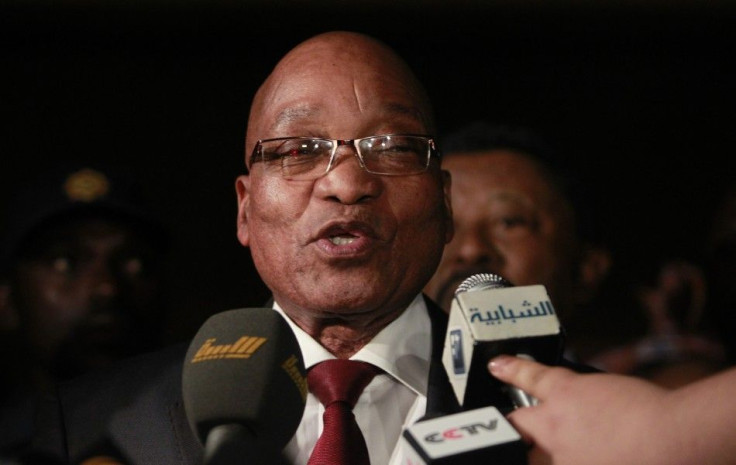S.Africa may reopen arms deal probe, pressuring Zuma

South African police may reopen a corruption probe into a multi-billion dollar arms deal involving several companies and high profile officials including President Jacob Zuma to see if charges can be instituted a decade after the transaction.
The investigation is likely to pile pressure on Zuma who is facing a leadership crisis in his ruling African National Congress and may deter his chances at a second term.
This comes a few days after the police's elite investigative unit, Hawks, raided the mining ministry over a questionable mineral rights deal that benefited Zuma's son and businessmen close to the president.
A letter from Hawks head Anwar Dramat to parliament's public accounts watchdog committee Scopa said investigators will approach British and Swedish authorities to establish if they have a strong case in South Africa.
"The two officials will assess the available information which points to a crime (or crimes) in South Africa or whether this information has evidential value in South Africa or whether it could be converted into relevant evidence by means of formal mutual legal assistance programmes," Dramat said in the letter obtained by Reuters.
Zuma -- then deputy president -- was linked to the 30 billion rand arms deal through his former financial adviser, who was jailed for corruption. This almost torpedoed Zuma's bid for high office but all charges against Zuma were dropped in 2009.
Despite calls from one of the closest allies of the ruling African National Congress to crush corruption, Zuma has done little to address a problem that has eroded confidence in the government ruling the continent's top economy.
The high-profile actions by the Hawks indicate a fresh willingness to investigate corruption allegations often swept under the rug, but the police's corruption busters may face a backlash from political leaders.
"They are subject to political will and if the department of justice is not on board, there is nothing the Hawks can change," said Susan Booysen, political analyst at Wits University.
The Sunday Times newspaper reported at the weekend that Hawks' investigators would go to Europe to probe revelations from Swedish defence group Saab that it and former partner BAE Systems made payments worth millions of rand to a South African "consultant" to secure a contract.
"Our review revealed that approximately 24 million rand was paid from BAE Systems ... These payments were transferred to the South African consultant shortly thereafter," Saab said last month in a statement.
South Africa spent about $5 billion in the late 1990s to modernise its military, with investigators probing several of the contracts on suspicion of bribes being paid to land the deals.
Zuma's former financial adviser Schabir Shaik was convicted in 2005 of trying to solicit a 500,000 rand a year bribe for Zuma from French arms company Thint in return for protecting it from an investigation.
© Copyright Thomson Reuters 2024. All rights reserved.











